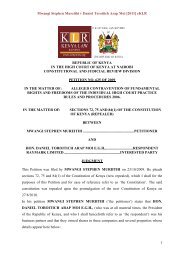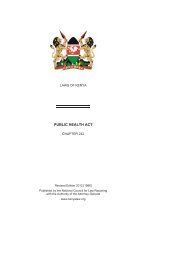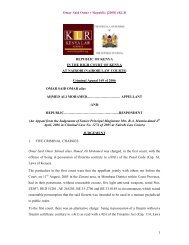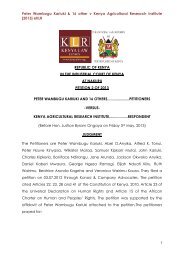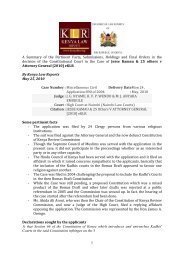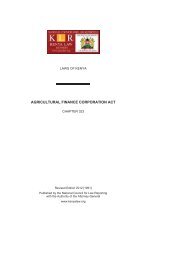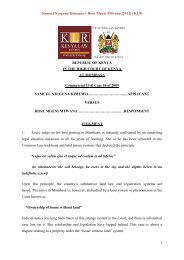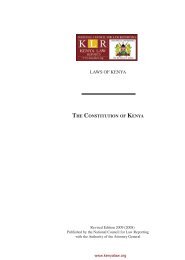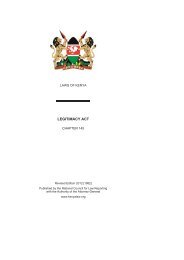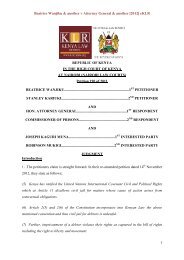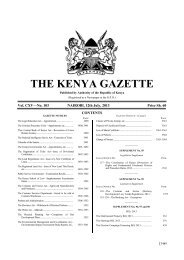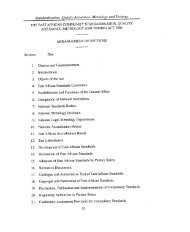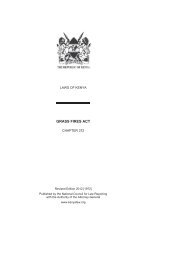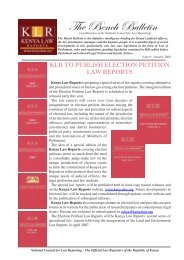Bench Bulletin - Issue 12 - Kenya Law Reports
Bench Bulletin - Issue 12 - Kenya Law Reports
Bench Bulletin - Issue 12 - Kenya Law Reports
Create successful ePaper yourself
Turn your PDF publications into a flip-book with our unique Google optimized e-Paper software.
KENYA LAW REPORTS<br />
BENCH BULLETIN<br />
FROM THE COURTS — HIGH COURT<br />
Criminal Practice and Procedure-affidavit-amendment-whether an affidavit may be amended- claim that the affidavit<br />
sworn by the Investigating Officer explaining the delay was referring to a different case-whether there was need for the<br />
respondent to seek to either amend the affidavit or alternatively, to seek leave to file a supplementary affidavit -where the<br />
only lawful option would be to file a supplementary affidavit-whether the affidavit was defective<br />
The applicant, who had been charged with murder, made a constitutional application to the court with a claim that his<br />
constitutional rights under sections 70 (a) and 72 (3) (b) and 77 (1) of the Constitution had been violated. In particular,<br />
the accused asserted that his detention beyond the period of 14 days from the date of his arrest, constituted a violation<br />
of his constitutional rights. The applicant had been held in police custody for six months before being arraigned in<br />
court.<br />
The Investigating Officer swore an affidavit in which he deponed that the delay in bringing the accused to court was<br />
attributable to a delay in conducting the post-mortem examination of the victim’s body as the family of the deceased<br />
could not be traced in good time to identify the body. The Investigating Officer also disclosed that the City Mortuary<br />
could not release to the police the results of the post mortem examination early enough, because of the unpaid mortuary<br />
charges.<br />
The accused submitted that the affidavit did not correlate to the case, because in his view, it was sworn to explain<br />
issues which arose in Criminal Case No. 87 of 2007, (whereas the case at hand was Criminal Case No. 86 of 2007). He<br />
further argued that the inability of the victim’s family to raise the fee payable for the post- mortem examination was<br />
not a justifiable explanation. The accused re-emphasized that where the constitutional rights of an accused person<br />
have been violated, he was entitled to an acquittal.<br />
The respondent on the other hand submitted that if there was any breach of the constitutional rights of the accused,<br />
the court had to apply the provisions of the Constitution in a wholesome manner. It was contended that the rights of<br />
the accused must be weighed as against the rights of the victim of the offence.<br />
Held:<br />
1. A perusal of the court file revealed that the affidavit of the Investigating Officer was sworn on the file before the<br />
court. There was therefore no need for the respondent to seek to either amend the affidavit or alternatively, to seek<br />
leave to file a supplementary affidavit.<br />
2. An affidavit could not be amended as it is made up of evidence, which the deponent of such affidavit tenders on<br />
oath. If after the affidavit is sworn and tendered to court or to any other body the deponent realizes that there are<br />
errors in it, the only lawful option available to him for setting out the correct factual position is through a supplementary<br />
affidavit.<br />
3. Pursuant to section 72 (3) of the Constitution, the police were obliged to explain to the court their reason for taking<br />
the accused to court so long after the expiry of the 14 days which the law allowed them. The onus was on the police<br />
to demonstrate that they took the applicant to court as soon as was reasonably practicable<br />
4. The body of the victim could not be identified until the members of the deceased’s family were traced and without<br />
the post mortem results, the cause of death could not be established. As long as the cause of death was not ascertained<br />
by the pathologist or by any other duly qualified medical practitioner, it would have been premature to prefer charges<br />
of murder.<br />
5. The scope of the reasons or explanations for not bringing an accused person to court within the prescribed time<br />
which may be acceptable to the court could not be exclusively delineated. So long as the explanation proffered was<br />
reasonable and acceptable, no problem would arise. Each case had to be considered on the basis of its peculiar facts<br />
and circumstances. In deciding whether there had been a breach of section 72 (3) of the Constitution, the Court had<br />
to act on evidence.<br />
6. Section 71 of the Constitution protected the right to life. However even though the deceased had been killed, the<br />
court could not use section 71 of the Constitution as a counter-weight to section 72(3) as an accused person is deemed<br />
to be innocent until and unless his guilt is proved. Nonetheless, the court had an obligation to give effect to section<br />
70 of the Constitution which provided that the rights and freedoms were subject to the rights of others and for public<br />
interest. Although the accused was entitled to his fundamental rights and freedoms, the enjoyment of the same was<br />
subject to the respect for the rights and freedoms of others and to public interest.<br />
7. Public interest required the court to carry out its mandate of dispensing justice without fear or favour. Whilst an<br />
accused person is presumed innocent until and unless he is proved guilty, public interest required the court to determine<br />
whether or not the accused was guilty. That could only be done if the prosecution was given the opportunity to lead<br />
evidence, during a trial. But then again, the courts had to also safeguard the fundamental rights of an accused person.<br />
It was for that reason that the court remained ever vigilant in the course of carrying out its mandate<br />
62



